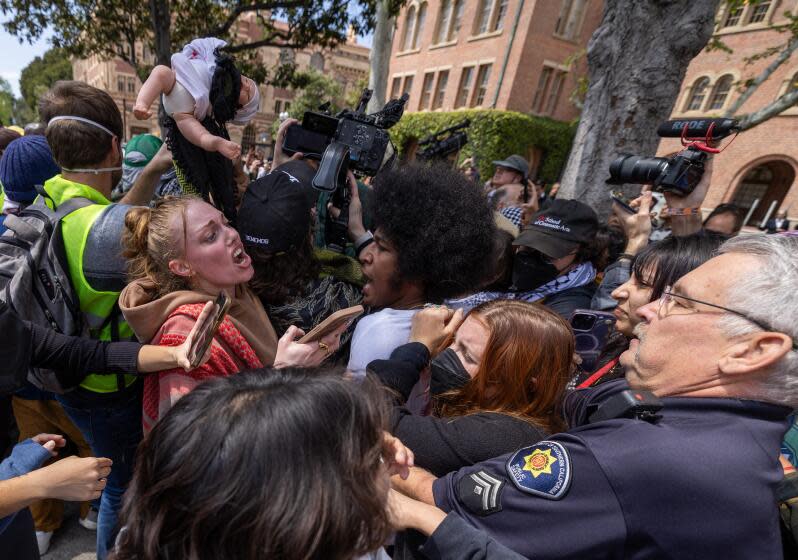Would pro-Palestinian demonstrators have disrupted a 2024 L.A. Olympics?

Los Angeles might have dodged at least one Olympic-sized headache by agreeing to wait until 2028 to host the Summer Games.
The reason?
If L.A. had won the right to host this summer — which almost happened — it might be scrambling to deal with more pro-Palestinian demonstrations and counter-demonstrations.
“It’s likely we would be seeing protests,” said Mike Duignan, a professor at Universite Paris 1 Pantheon-Sorbonne. “We have seen how events, particularly large-scale major events, serve as platforms for resistance.”
Seven years ago, when the International Olympic Committee met to choose a host for 2024, officials made a surprise announcement, naming both L.A. and the other finalist — Paris — as winners, with L.A. agreeing to go second in exchange for financial considerations.
Read more: After violent night at UCLA, classes cancelled, UC president launches investigation into response
Now French organizers are learning about the Games’ vulnerability to protest. The Israel-Hamas war is not to blame; it is political tumult of another kind in New Caledonia.
The Olympic torch relay, working its way from Greece to Paris, was scheduled to pass through the French Pacific territory on June 11. But rioting prompted by controversial voter reforms has sent hundreds of French soldiers and police onto the streets of the capital city.
On Saturday, French sports minister Amelie Oudea-Castera canceled the torch’s visit, saying “priority must be given to a return to calm.”
The Olympics have an unfortunate history with political upheaval, most significantly with the terrorist attack on Israeli athletes at the 1972 Munich Games. The Olympic torch has also been a target.
The relay for the Turin Olympics weathered numerous protests in 2006. Human rights activists caused disruptions and even forced officials to briefly extinguish the flame when Beijing hosted in 2008.
Read more: L.A. officials study Paris as they prep for the 2028 Olympics
Things went smoothly the last time L.A. held the Games in 1984. After the flame landed on American soil, 3,636 torchbearers traversed more than 9,300 miles through 33 states and the District of Columbia, with the only delays caused by bad weather and unexpectedly large crowds.
Recent events suggest the passage might have been more difficult this spring.
Pro-Palestinian demonstrations have interrupted a St. Patrick’s Day parade in Omaha and an Easter Vigil Mass at St. Patrick’s Cathedral in New York. In Southern California, demonstrators holding signs that read “CEASE-FIRE” sat in the middle of Colorado Boulevard, halting the 2024 Rose Parade for about 10 minutes.
A torch relay stretching thousands of miles across the U.S. would be far more vulnerable.
“The transfer of the torch is quite symbolic and it’s a visible activity,” said Craig Barkacs , a business law professor at the University of San Diego who specializes in ethical and political issues. “You cannot adequately defend it.”
This story originally appeared in Los Angeles Times.

